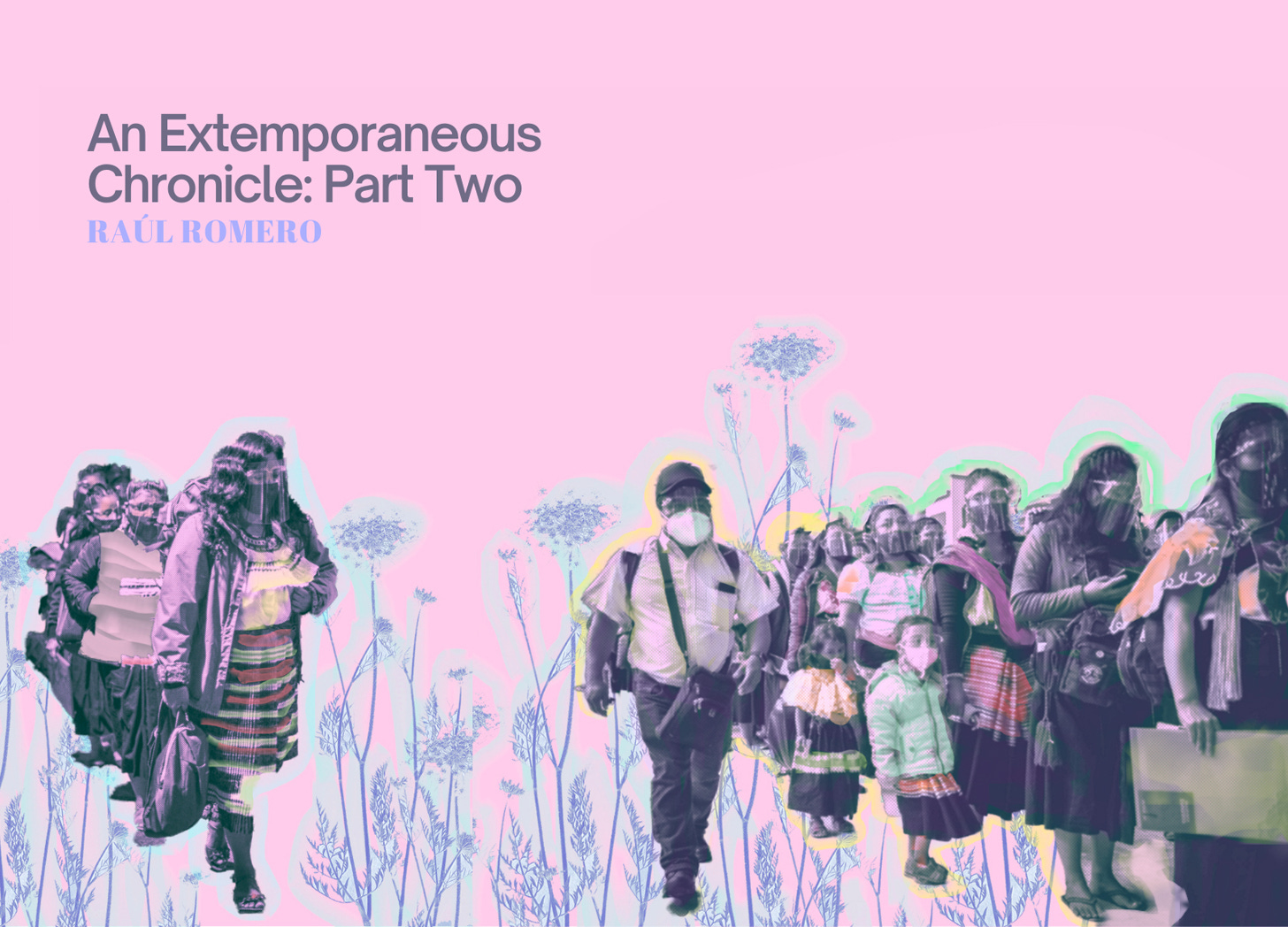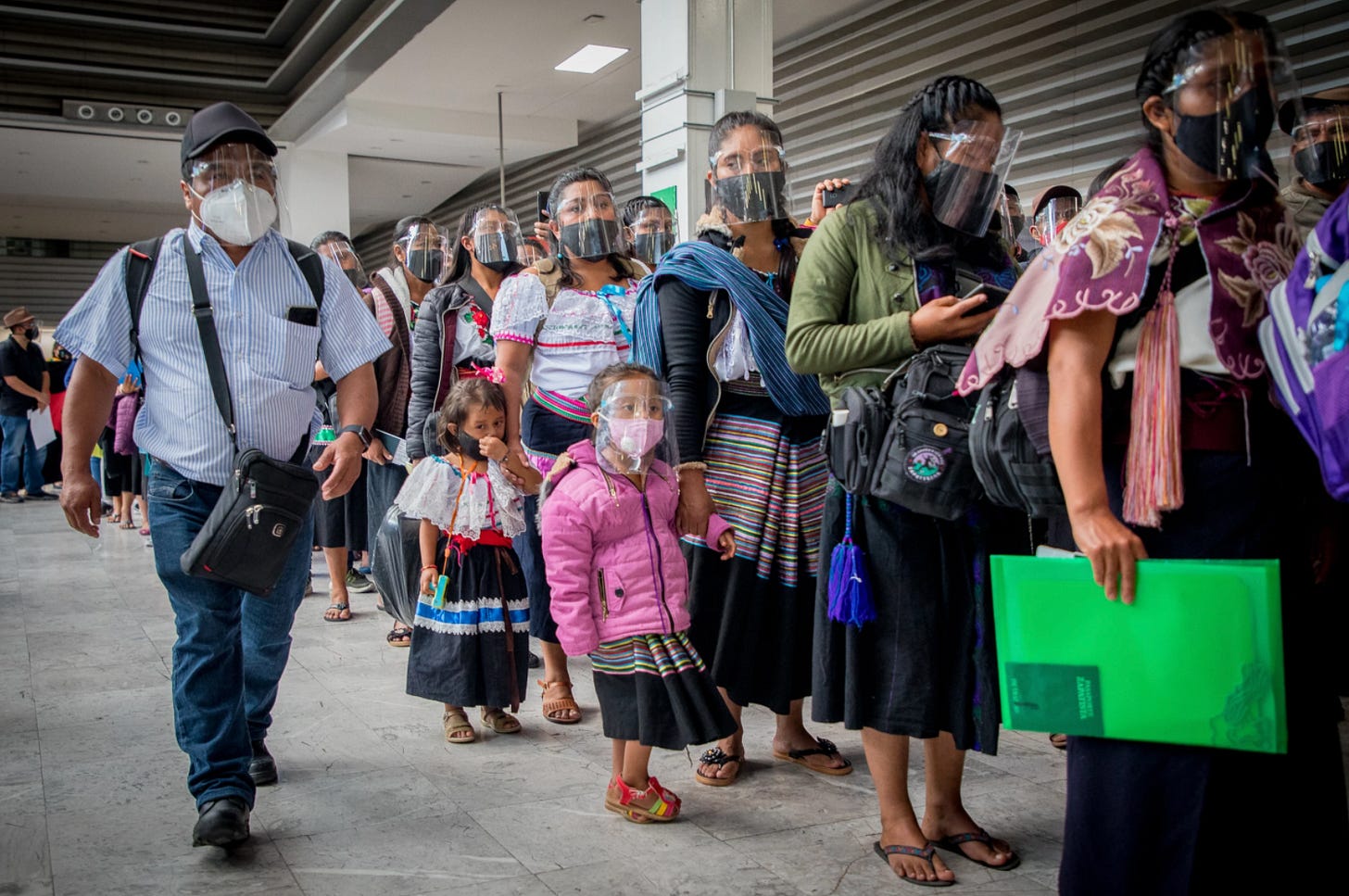An Extemporaneous Chronicle, part II
An immersive narrative – as it is characteristic of Raúl Romero, describing the challenging trajectory of La Extemporánea from San Cristóbal de las Casas to Vienna, Slumil K'Ajxemk'Op's territory.
A continuation of “An Extemporaneous Chronicle: Part One” available here.
Saturday, September 11.
MEXICO CITY– The Extemporaneous has in its itinerary the fulfillment of PCR tests, one of the requirements to be able to travel. In addition, all adults travel fully vaccinated and with supporting documents. Similarly, all of them hold passports, after more than 6 months of paperwork and denunciations.
As reported by the Zapatistas, in order to secure their travel documents, several members of the airborne delegation were subjected to racist, xenophobic and patriarchal violence by officials of the Ministry of Foreign Affairs.
In the afternoon only a small delegation goes to the airport to receive Squadron 421 returning to Mexico. The rest of the members will prepare their paperwork.
On Sunday, September 12, preparations continue. Squadron 421 has quick chats with their fellow comrades of La Extemporánea, providing them with advice for the voyage. The 421 Squadron functioned as a kind of outpost and now they begin to tell what they experienced.

On Monday, September 13, at 6:30 a.m., the first group of Zapatistas once again had to transfer, this time to the Mexico City airport, to board the plane that would take them to Vienna.
They board the awaiting vans in an orderly fashion. They travel very lightly, considering the more than two and a half months they will be in the rebellious Europe. All of them travel with their binders, in which they carry all the requirements for travel. One of them brings a plastic folder that reveals his Zapatista Passport, the journal in which he will take his observations of the experience. The girls bring small cameras, that they have quickly learned to use. Again, everyone brings masks, face-shields and small bottles of disinfectant gel.
The Zapatistas line up. They prepare their documentation to check in their luggage and get their boarding passes. One woman wants to skip the line. She protests to the staff at the counter. She is not uncomfortable waiting in line, she is uncomfortable waiting behind the indigenous men and women.
An airline clerk walks by asking who is traveling first class. He addresses everyone he finds near the counter, except for the Zapatistas.
The compas begin to pass by. All of them are prepared with all the necessary papers. The same does not apply to some of the travelers: they did not realize that they had to bring proof of vaccination or printed PCR results. They will miss their flight.
More than two hours after arriving at the airport, La Extemporánea makes it through the first filter. They line up for screening. A door has been opened for them to pass through.
The airport officials finally seem to understand that screening them as a group and not as individuals would be more operative. These are not privileges, just common sense, sometimes the most difficult of the senses.
Subcomandante Insurgente Moisés heads the contingent. It is difficult to recognize him: he does not wear a ski mask or the hat that characterizes him. He is also dressed very formally. But his gaze above the mask and behind the visor help to distinguish him. The respect that all and everyone has for him also gives him away.
The agent who receives them asks those in front of them to always have their passport and boarding pass in hand. A woman lifts her arm with her passport and boarding pass and shouts passports, immediately everyone begins to raise their arms with the same documents.
The gesture is simple, but it says a lot: they have conquered, for this occasion, the racism of the State that denied them the right to possess a passport.
The people who have come to see La Extemporánea off look happy. They have not stopped shouting mottos, Zapatista chants and slogans. A woman repeatedly tells them: "have a good trip, compas, sow many seeds of rebellion". The members of Comando Palomitas are holding one hand of their parents, and with the other they are saying goodbye to those of us who are there. They are very charming and full of joy.
This is undoubtedly one of the greatest achievements of Zapatismo: that children no longer die of curable diseases, and that, instead, children laugh, play and travel the world spreading their joyful rebellion.
During the afternoon, the second block of La Extemporánea will perform the same task: board the vans, arrive at the airport, line up, check that they are vaccinated and/or with PCR, register their luggage, obtain boarding passes, and proceed to the terminal. It is all much quicker: in less than 40 minutes the more than 60 compas in this group have accomplished this. There is much delight and joy among those of us who are bidding farewell.
On the night of that Monday, September 13, the rumors that were circulating in WhatsApp groups began to be confirmed. The paramilitary group ORCAO had once again targeted the Zapatista Support Bases in Chiapas. As a result of the attack, José Antonio Sánchez Juárez and Sebastián Núñez Pérez, both autonomous civilian leadership of the Good Government Council (JBG) "Nuevo Amanecer en Resistencia y Rebeldía por la Vida y la Humanidad" based in the community Patria Nueva, Caracol 10 "Floreciendo la Semilla Rebelde" (Flourishing the Rebel Seed) remain missing.
The attacks by ORCAO against the Zapatista villages are continuous. It has been denounced on many occasions and it has also been documented how this group uses state resources to arm itself and target the autonomous communities and their supporters. The negligence of the municipal, state and federal governments in the face of these aggressions goes beyond incompetence and is clear evidence of their complicity.
In Vienna, upon arrival, the first block of La Extemporánea is received by organizations in solidarity. There is music, joy, celebration. That which seemed impossible, the Journey for Life, begins to become a concrete reality... as the Zapatistas always manage to do.
In his first speech, Subcomandante Insurgente Moisés speaks of the struggle for life, of the human-nature nexus, of the need to fight everywhere. His message is powerful and radical:
"the destruction of nature is not the fault of the citizenry, it is the fault of capitalism."
In Mexico and Europe, the news of the disappearance of José and Sebastián spreads. In response, solidarity networks and human rights institutions express themselves and issue communiqués condemning the attack and demanding the return of the Zapatistas alive.
In Vienna, La Extemporánea attends a demonstration organized by local collectives in front of the Mexican consulate. The Zapatistas in Austria demand the release of their comrades in Mexico. In other European nations, demonstrations are organized for the same purpose. The Journey for Life - European Chapter has begun and as before, the Zapatistas know that their commitment to fight for life will be opposed by the ruling powers with death. This is what they said in the Fourth Declaration of the Lacandon Jungle in 1996:
"Our struggle is for life, and the bad government offers death as a future".
The Journey for Life has begun. Zapata rides again, but now he also rides in Defiant Europe. His cry for Land and Liberty has also expanded: Land, Life and Liberty!
What is left is what is left.
Published originally in Mexican-Castilian language by Camino al Andar. Part one of two, the second part to be published tomorrow.
Chronicle by Raúl Romero, photographs by Francisco Lion.
Translation by taller ahuehuete.










